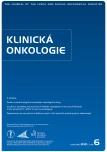-
Medical journals
- Career
Clinical application of time factor principles in radiotherapy in compensation of radiation series interruptions
Authors: Z. Pechačová 1; R. Lohynská 1,2
Authors‘ workplace: Ústav radiační onkologie 1. LF UK a FN Bulovka, Praha 1; Onkologická klinika 1. LF UK a FTN, Praha 2
Published in: Klin Onkol 2021; 34(6): 455-462
Category: Review
doi: https://doi.org/10.48095/ccko2021455Overview
Background: The time factor plays a key role in radiotherapy. The radiotherapy overall treatment time is one of the most important predictive factors in the treatment effectiveness and is associated with better local control and impact on the overall survival. The length of the time from the diagnosis to radical radiotherapy or from surgery to adjuvant radiotherapy or the use of alternative fractionation schemes shortening the total treatment time also play an important role. The prevention of prolongation of the radiation series remains a fundamental and well feasible way of applying the time factor in radiotherapy. Purpose: Interruption of radiotherapy usually occurs for technical reasons, due to factors at the patient’s side or for personnel reasons of the department. Standard procedures for the compensation for treatment breaks are part of the treatment protocols at radiotherapy departments. Possible risks of the discontinuation of radiotherapy are considered on the basis of the type and extent of the disease, the treatment intent and the condition of the patient, and the need of compensation for a break in the treatment is set. Patients are classified into three categories according to the above mentioned parameters. Compensation for the pause in radiotherapy is performed by calculating the equivalent dose in 2 Gy per fraction (EQD2); the preferred method of compensation is the one which enables observation of the planned total time of radiotherapy without extension. The benefit of local tumor control and the risk of increased acute or especially late toxicity should always be considered. In the current epidemiological situation, radiotherapy is often discontinued for COVID-19, and due to longer breaks in the treatment, it is necessary to combine multiple compensation methods in one patient.
Keywords:
time factors – Radiation therapy – COVID-19 pandemic – radiobiology – treatment effectiveness
Sources
1. Lohynská R, Jirkovská M, Krátká Z. Časový faktor v radikální radioterapii nádorů hlavy a krku. Postgraduální medicína 2020; 2 : 115–120.
2. Lohynská R. Časový faktor v radikální radioterapii nádorů hlavy a krku. Praha: 2. lékařská fakulta Univerzity Karlovy 2007.
3. Overgaard J, Hansen HS, Specht L et al. Five compared with six fractions per week of conventional radiotherapy of squamous-cell carcinoma of head and neck: DAHANCA 6,7 randomized controlled trial. Lancet 2003; 362 (9388): 933–939. doi: 10.1016/s0140-6736 (03) 14 361-9.
4. Gonzalez Ferreira JA, Jaen Olasolo J, Azinovic I et al. Effect of radiotherapy delay in overall treatment time on local control and survival in head and neck cancer: review of the literature. Rep Pract Oncol Radiother 2015; 20 (5): 328–339. doi: 10.1016/j.rpor.2015.05.010.
5. Joiner MC, van der Kogel A. Basic clinical radiobiology. 5th ed. CRC Press/Taylor & Francis Group 2019.
6. Lancia A, Bonzano E, Bottero M et al. Radiotherapy in the era of COVID-19. Expert Rev Anticancer Ther 2020; 20 (8): 625–627. doi: 10.1080/14737140.2020.1785 290.
7. Guckenberger M, Belka C, Bezjak A et al. Practice recommendations for lung cancer radiotherapy during the COVID-19 pandemic: an ESTRO-ASTRO consensus statement. Radiother Oncol 2020; 146 : 223–229. doi: 10.1016/j.radonc.2020.04.001.
8. Thomson DJ, Palma D, Guckenberger M et al. Practice recommendations for risk-adapted head and neck cancer radiotherapy during the COVID-19 pandemic: an ASTRO-ESTRO consensus statement. Int J Radiat Oncol Biol Phys 2020; 107 (4): 618–627. doi: 10.1016/j.radonc.2020.04.019.
9. Šlampa P, Petera J. Radiační onkologie. 1. vyd. Praha: Galén Karolinum 2007.
10. Pechačová Z, Končeková J, Lohynská R et al. Paliativní radioterapie v managementu symptomů pokročilého onkologického onemocnění. Onkologie 2020; 14 (6): 271–277.
11. The Royal College of Radiologist. The timely delivery of radical radiotherapy: guidelines for the management of unscheduled treatment interruptions. 4th ed. London 2019.
12. Hendry JH, Bentzen SM, Dale RG et al. A modelled comparison of the effects of using different ways to compensate for missed treatment days in radiotherapy. Clin Oncol 1996; 8 (5): 297–307. doi: 10.1016/s0936-6555 (05) 80715-0.
Labels
Paediatric clinical oncology Surgery Clinical oncology
Article was published inClinical Oncology

2021 Issue 6-
All articles in this issue
- Editorial
- Waldenström macroglobulinemia
- Erdheim-Chester disease
- Endocrine late effects of cancer treatment
- Advanced stages of classical Hodgkin lymphoma – first-line treatment options
- Clinical application of time factor principles in radiotherapy in compensation of radiation series interruptions
- Recommendation for preventive and therapeutic skin care of patients undergoing radiotherapy
- Anotace knihy
- Aktuality z odborného tisku
- Účinnost a bezpečnost entrektinibu při léčbě nádorů s genovou fúzí NTRK
- Polymorphisms rs4673 and rs28714259 in predicting anthracycline-mediated cardiotoxicity in patients with breast cancer
- Incidence, mortality and survival of bladder neoplasms in the Czech Republic in the period 1977–2017: a time trend analysis
- Primary breast lymphoma – a case report
- Clinical Oncology
- Journal archive
- Current issue
- Online only
- About the journal
Most read in this issue- Waldenström macroglobulinemia
- Erdheim-Chester disease
- Recommendation for preventive and therapeutic skin care of patients undergoing radiotherapy
- Advanced stages of classical Hodgkin lymphoma – first-line treatment options
Login#ADS_BOTTOM_SCRIPTS#Forgotten passwordEnter the email address that you registered with. We will send you instructions on how to set a new password.
- Career

